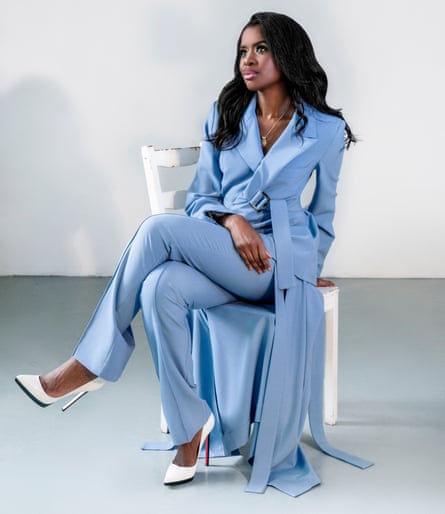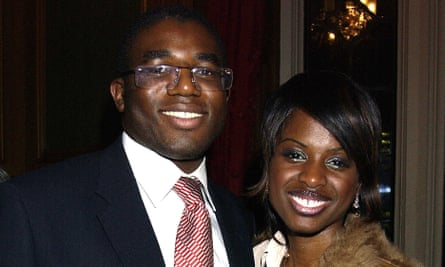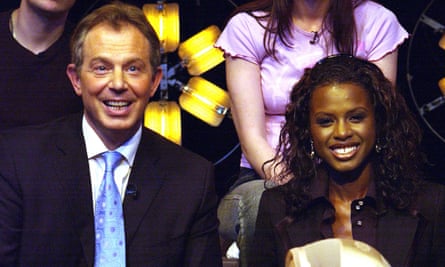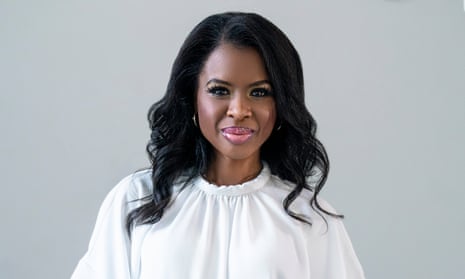June Sarpong has only been drunk precisely once. She was 20, working for Arista Records, and had helped organise the launch party for Janet Jackson’s 1997 album, The Velvet Rope. “Everyone was there –the Spice Girls. Naomi Campbell.” Sipping on a cup of hot water and lemon on a canalside terrace, she lets out a tickled “Whew!” at the recollection.
Several tequila slammers and some pink champagne later, she pinballed home, woke up the next day “with zero hangover” and decided there and then that booze wasn’t for her. “But parties, I like. The Janet one is still one of the best I went to.” When pressed, Sarpong will admit that a do at Elton John’s mansion, a fashion party in Monaco with Hollywood A-listers, Ibiza’s Manumission in its live sex-show heyday and a charity event with Bono all rank fairly high on the list. “Wild,” she says, eyebrows raised but gossipy secrets sealed.
“I’m an enabler,” she jokes. “I ply friends with alcohol when they come over, I just don’t participate.” Does she not get bored hanging out with drunk people? “In our industry? No! I’m used to it. Who isn’t drunk? The only people I notice are the ones who are sober,” she says, her glorious cartoon cackle let loose.
For a particular generation, Sarpong’s laugh – an irresistible elastic giggle once described as “a celebratory roar that makes you imagine party poppers and champagne corks” – is etched in distant memory. Along with an obsessive lip gloss habit, it became her trademark when interviewing pop stars and confused-looking celebrities on MTV and T4, Channel 4’s weekend youth strand. Then, ironically, Sarpong’s languid, flirty delivery had viewers accuse her of being drunk as she and co-star Vernon Kay larked about on live TV.

But she has never needed booze to be merry – a fact that probably helped when she began getting called on to do jobs that demanded hard work and squeaky-clean credentials: days of unprecedented access to Tony Blair for a documentary when he was prime minister; a gig presenting Nelson Mandela’s 90th birthday; being a tireless ambassador of the Prince’s Trust; as the face of the Make Poverty History campaign. At the beginning of her career she dated David Lammy (they split in 2003 and remain good friends), but she made lasting friendships across the Labour Party while hosting pop shows on telly.
Now she is the author of three books – we’re meeting to discuss her third, The Power of Privilege, a smart and digestible manual on how white people can challenge racism – of the kind endorsed by Desmond Tutu and Kofi Annan. Last year the BBC headhunted her to become its creative director of diversity. It’s a huge job, albeit part-time for three days a week, that inserts itself in commissioning departments and channels across the board to try to achieve the BBC’s pledge that 20% of its workforce come from diverse backgrounds. In an organisation of 27,000 employees, Sarpong’s brief can’t be easy.
“Well, we know that if you look at who’s had access to opportunity across the board, it’s been a very, very small group in society,” she says. “In order to reverse that and jumpstart the system, you have to intervene. People are very comfortable with targets and goals in all areas of business; it’s only when you start talking about targets for people that there is debate. But I’m not wasting time or energy with anyone who doesn’t want to do it. Especially when there are lots of people who do. My focus is there.”
On the morning we meet, the actor Laurence Fox, a vocal critic of the BBC, has announced he is setting up a new political party to “reclaim” British values. The news comes days after Andrew Neil announces he is leaving the BBC to set up his own right-leaning opinionated 24-hour news channel, akin to Fox News.
Does Sarpong worry that the “debate” is set to become that much more toxic and divisive?
“I can’t speak on behalf of either of them, but I would tell you something: Andrew [Neil] is one of the most inclusive people in this industry, in terms of who he hires and promotes and champions. A lot of black people in the industry would agree. I don’t know what he’s doing with his news channel, but we do need to keep having sophisticated, nuanced conversations.” Sarpong waves a hand at the morally absolute framing of villains and heroes. “It’s too binary,” she says. “And life isn’t binary. We don’t allow people to be fully formed humans. The biggest misconception about me is that I’m ditsy. And sometimes you can be ditsy, but that does not mean you can’t be serious, methodical and strategic.”

It’s worth remembering that Sarpong really was a rarity in the industry when she started out as a young, black woman fronting mainstream British TV. There were nicks made to her self-esteem and credibility along the way, but she always seemed to wear it lightly. When she joined MTV at 21, for instance, part of a new wave of female presenters including Cat Deeley, Edith Bowman and Donna Air, Sarpong was excluded from a magazine cover shoot celebrating the station’s hot new female talent. At the time, she shrugged it off. “The worst was that it wasn’t the magazine that had made the decision – it was MTV,” she says now. But she kept her head down and stuck to the immigrant parent script: you have to work twice as hard for half as much.
Sarpong was born in east London in 1977 to Ghanian parents. The family, including her older brother Sam, moved back to Ghana when she was two to live a comfortably upper-middle-class life. Following the coup of 1981, the Sarpongs fled the country and ended up in a council estate in Walthamstow. Her parents divorced by the time she was seven; her father and Sam moved to the US and set up home there, while her mother worked as a nurse, remarried, and stayed in London with her three daughters.
Sarpong said she “got on with everybody at school – the popular kids, the misfits, the geeks before they became cool,” but suffered a horrific car accident in her mid-teens and was immobile for two years. It didn’t dim her focus.
“I turned up to my first job at Kiss FM in a neck brace,” she says, fondly name-checking Trevor Nelson as one of her first champions. “I wouldn’t be here without a lot of people who helped me and looked out for me along the way. That’s why it’s so important to keep paying it forward.”
From Kiss FM onwards, Sarpong’s career seemed to rocket. At the height of her fame, she became a character on Bo’ Selecta! and Ricky Gervais wrote her into an episode of Extras.

“I went as far as I could go here,” she says, her hand miming the ceiling. “I was committed to television, I wanted to be like Davina McCall. But what we call ‘shiny-floor shows’ [Saturday-night family TV shows] weren’t available to me.”
By the end of 2007, like her peers Dermot O’Leary and Russell Brand, Sarpong had grown up and out of the youth TV she had come up with. She was awarded an MBE, called it quits on T4 and like plenty of black British talent before and after her, moved to the US.
“I remember meeting with one particular senior executive for a more adult-focused documentary. A mandate had come on high from the boss to have me on board, but the executive couldn’t get past her preconceived ideas of who she thought I was. I was never patronised more in my life. My agent was furious. I just thought, ‘You know what, I don’t want to start doubting myself and my ability, my worth and value.’”
In New York, Sarpong jumped in and expanded her wheelhouse: she became a businesswoman and co-founded WIE (Women: Inspiration and Enterprise) and put on conferences with the likes of Sheryl Sandberg and Arianna Huffington. She stayed for eight years before coming home and immediately joining the board of the Remain campaign.
“That dinner [the night of the vote] with George Osborne and Peter Mandelson, when the results started coming in…” She lets out an exaggerated exhale. “Woooh, I gave up the ghost early. I left after Sunderland was called.”

You can see why Sarpong is as well- connected and effective as she is, whether it’s presenting The Pledge on Sky News, a topical panel show with rightwing motormouths, such as Nick Ferrari, or being called on to sort out the Beeb. At 43, she values being able to understand and get on with people she fundamentally disagrees with in order to win rare, incremental, shifts in their perspectives. She’s not asking for a radical dismantling of the system, but aims to work within it.
“I believe when life gives you lemons, you make lucrative lemonade. I love the younger generation; they’re not taking anything. They call me Aunty. I love it.” She laughs again. “We’re doing lots to level the playing field for them, but it’s not the same – it’s not. And sometimes we do our young people a disservice by making them think it is, because when they do come up against that kind of systemic racism, that systemic inequality, they are crushed by it.”
Underneath her intensely likable effervescence, Sarpong is resolutely steely. It is curious how much she takes on – even her current CV lists a collection of board memberships and charity work – without feeling overwhelmed. Would she want another go at primetime TV?
“I’m happy dabbling! I do The Pledge, I did a bit of Loose Women. It’s fun, but there is so much talent out there, I’m more excited about bringing the next generation through. I’ve done it.”
Plus, she insists, “I think I’m better at listening than I am at talking,” which is saying something because Sarpong is a champion of chat. Not just easy, breezy nattering – the kind that gifted her the nonstop presenting jobs in her 20s and turns our one interview into two – but big, instead of small talk. “People often want to tell me their whole life story. Sometimes I’ll be sat at a dinner next to someone telling me things they’ve never told anyone else before. It happens a lot.”
A lack of showbiz ego and an innate warmth on her part helps; the photo grapher and stylists melt when she starts gabbing. She’s a born butterfly. “If I hadn’t become a television presenter,” she says, “I’d probably be a therapist.”

The surprising thing for anyone who remembers her best for creasing up while flirting with Jamie Foxx (“He’s quite a fruity guy, let’s just put it that way”) or taking Kanye West for a haircut (“Musical genius, but the worst: I never want to interview him again”), is how poised Sarpong 2.0 is. Everyone grows up, even if they were once the Tinkerbell of T4. And Sarpong has weathered her share of knocks.
In 2015, Sarpong’s older brother, a seemingly happy and successful US model and actor, took his own life in California. Sam Sarpong Jr didn’t drink or do drugs, and had no known medical history of mental-health problems. The family was devastated; her father became a shell of his former self and June moved back to London, holding on hard to her Christian faith to get through the grief.
“I’ve been through a lot of… I’ve had some shit in my life and I don’t want to go into it, but I’ve had some terrible times. And when you’ve been through that, you are grateful for an uneventful day, waking up happy, alive and healthy.” It’s a perspective that makes lockdown entirely bearable for her. If having to figure out five different video-meeting platforms in a day is as bad as it gets, she says she has little to complain about.
“I didn’t and I don’t have the luxury of being mediocre, or the luxury of people assuming my opinion is valid because of the package I come in,” she says, matter of factly. “I’ve always been doubted – I didn’t go to university, I’m not Oxbridge-educated, but I never allowed that to bother me, because I’ve never believed that is the only sign of intelligence. What I do know is that if somebody has hired me – even if they consider it the diversity hire – I know when I get there that I can do the job. I’m not doubtful.”
The Power of Privilege by June Sarpong, is out now HQ £5). Buy a copy for £4.65 at guardianbookshop.com. In the UK and Ireland, Samaritans can be contacted on 116 123, or at samaritans.org
Photographer’s assistant Gemma Poniente; makeup by Jessie Barker using Pat McGrath Labs, Kevin Aucoin and Juvia’s Place; hair by Charlotte Mensah using Mankettioil Products; styling by Vasco Cruz
